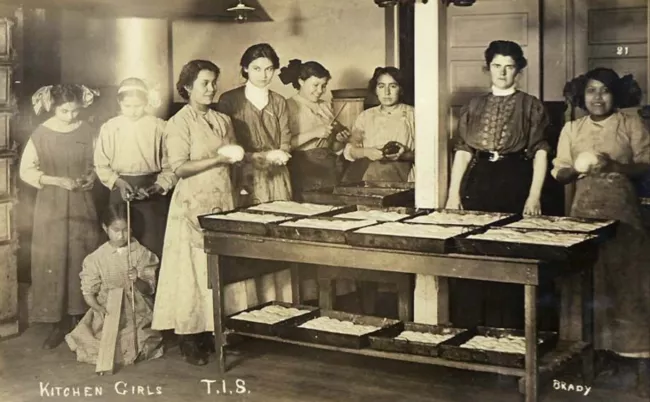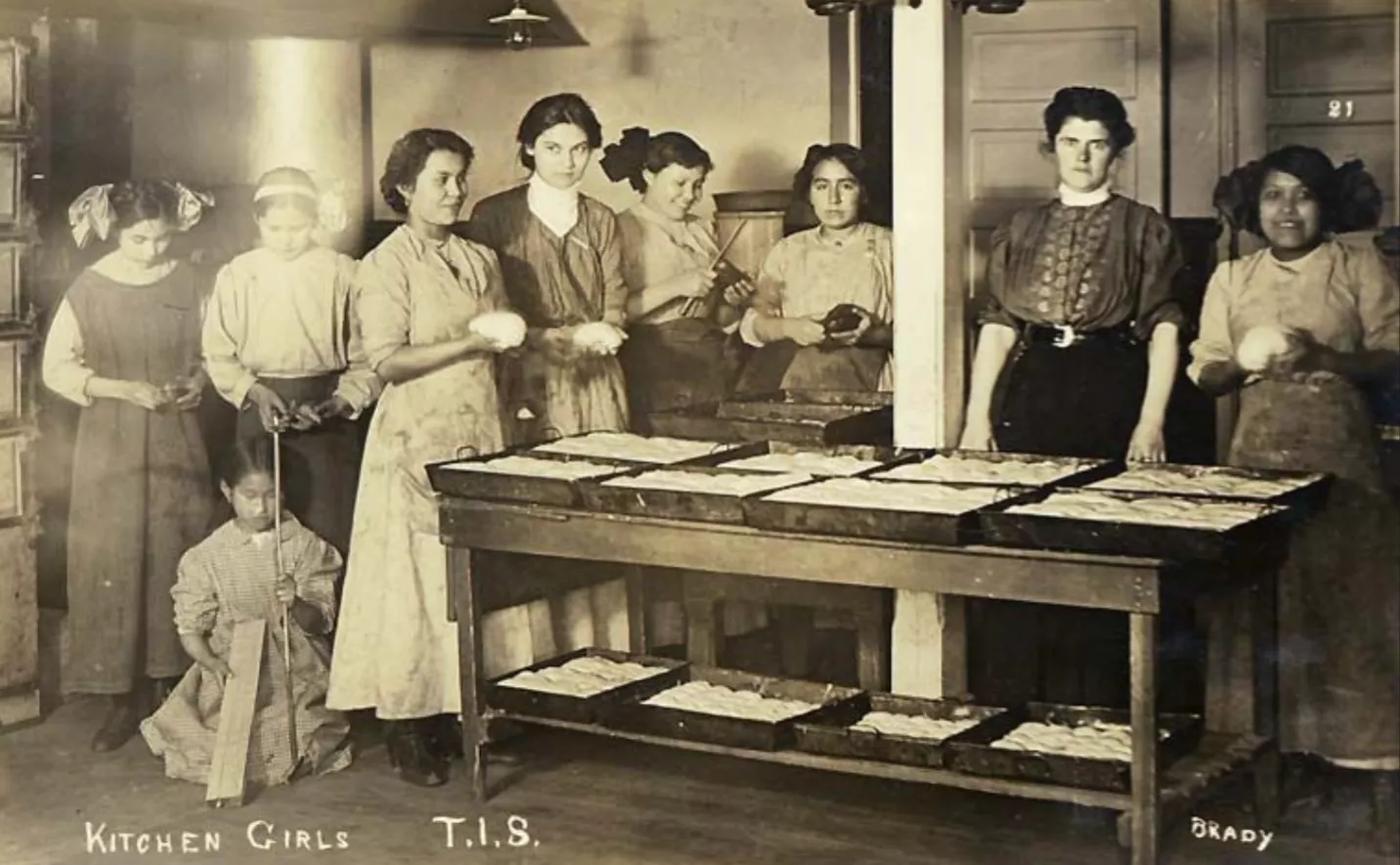Video Replay of Panel Discussion: Hidden Silence


The Long Term Impacts of Residential and Boarding Schools for Native People
In this roundtable, speakers Bev Sellars (Xat’sull First Nation), Hollie Mackey (Northern Cheyenne), and Anna Lees (Little Traverse Bay Bands of Odawa) will address the long-term impacts of residential and boarding schools for Native people in the U.S. and Canada.
Drawing on their own experiences, work, and activism, they will reflect on the effects of lasting trauma and discuss efforts of healing and rehabilitation for Indigenous communities.
This panel seeks to further contextualize the 2023 Joseph and Rebecca Meyerhoff Annual Lecture co-hosted by Western Washington University and the United States Holocaust Memorial Museum on Friday, April 7, 2023.
Event Schedule
2-4 PM Roundtable Discussion
Miller Hall 138
4 PM Bookstore Sale Event
Miller Hall 138
Land Acknowledgment and Blessing
Blessing and Land Acknowledgement from Lummi Nation Elder Juanita Jefferson and Laural Ballew, Western's executive director of American Indian/Alaska Native and First Nations Relations & Tribal Liaison to the President.
Speakers
Bev Sellars is a former councillor and chief of the Xat’sull (Soda Creek) First Nation in Williams Lake, British Columbia. First elected chief of Xat’sull in 1987, she held the position from 1987-1993 and then from 2009-2015. Between her terms as chief she earned a degree in history from the University of Victoria (1997) and says “My “aha” moment came when I was taking European history.” This was followed by a law degree from the University of British Columbia. She has served as adviser for the B.C. Treaty Commission and a representative for the Secwepemc communities on the Cariboo Chilcotin Justice Inquiry in the early 1990s. Bev is currently the chairperson of the First Nation Women Advocating for Responsible Mining (FNWARM) which monitors proposed and existing mining operations in BC.
Sellars has long been an activist and spoken out on racism and residential schools and on the environmental and social threats of mineral resources exploitation. Sellars is the author of They Called Me Number One, a memoir of her childhood experience in the Indian residential school system and its effects on three generations of women in her family, published in 2013 by Talonbooks. The book won the 2014 George Ryga Award for Social Awareness, was shortlisted for the 2014 Hubert Evans Non-Fiction, and was a finalist for the 2014 Burt Award for First Nations, Métis and Inuit Literature. Her book, Price Paid: The Fight for First Nations Survival, published in 2016 by Talonbooks, looks at the history of Indigenous rights in Canada from an Indigenous perspective (see the interview in Prism International ). She was named the 2016-17 Distinguished Alumni by the University of Victoria.
Hollie J. Mackey is an enrolled member of the Northern Cheyenne nation presently located in Southeastern Montana and Associate Professor of Education at North Dakota State University. Her scholarship empirically examines the effects of structural inequity in Indigenous and other marginalized populations in educational leadership and public policy using multiple critical frameworks and methodologies. As an experienced policy consultant, public speaker, program evaluator, and community educator, she seeks to bridge theory and practice as a means of addressing complex social issues from an interdisciplinary perspective.
She is the recipient of the D. J. Willower Center for the Study of Leadership and Ethics Award for Excellence and the Jack A. Culbertson Award for outstanding accomplishments as a junior professor of educational leadership. She serves as the Associate Co-Director for the Barbara L. Jackson Scholars Network at the University Council for Educational Administration and Associate Director of the Consortium for the Study of Leadership and Ethics in Education. She earned her bachelor’s and Masters of Science in Public Relations at Montana State University-Billings, Masters of Legal Studies in Indigenous People’s Law at the University of Oklahoma, and Ph.D. in Educational Leadership and Policy Studies at the Pennsylvania State University.
Executive Director: White House Initiative on Advancing Educational Equity, Excellence, and Economic Opportunity for Native Americans and Strengthening Tribal Colleges and Universities, U.S. Department of Education
Anna Lees Ed.D. (Little Traverse Bay Bands of Odawa Indians, descendant) began her career as an early childhood classroom teacher in rural northern Michigan. Now, an Associate Professor of Early Childhood Education at Western Washington University, she partners with schools and communities to prepare teachers for the holistic needs of children, families, and communities.
Anna is committed to developing and sustaining reciprocal relationships with Indigenous communities to engage community leaders as co-teacher educators, opening spaces for Indigenous values and ways of knowing and being in early childhood settings and higher education. She is currently engaged in research around land education professional development led by Indigenous nations and Indigenous curriculum development with tribal nation early learning and community programs.
Her scholarship has been recognized by the American Association of Colleges for Teacher Education’s Journal of Teacher Education, Journal of Early Childhood Teacher Education, the Spencer Foundation, and the National Science Foundation; she currently serves as editor of the Tribal College and University Research Journal and co-chair of the American Educational Research Association’s Indigenous Peoples of the Americas special interest group.
Campus Partners
Co-Sponsors
- Counseling & Wellness Center
- Department of Anthropology
- Honors College
- Department of Political Science
- Provost’s Office
- Salish Sea Institute
- Center for Law, Diversity, and Justice
- Enrollment and Student Services
- Viking Union
- Department of Modern & Classical Languages
- Morse Institute for Leadership Studies
- Access, Diversity, Equity, and Inclusion Unit of Enrollment and Student Services
- College of Business and Economics
- Western Libraries
- Department of Journalism
- College of the Environment
- History
- Office of Equity
- Bellingham Public Schools
- Department of Linguistics
- Center for Canadian American Studies
- Geology
- The Office of the President
- Institute for Global Engagement


